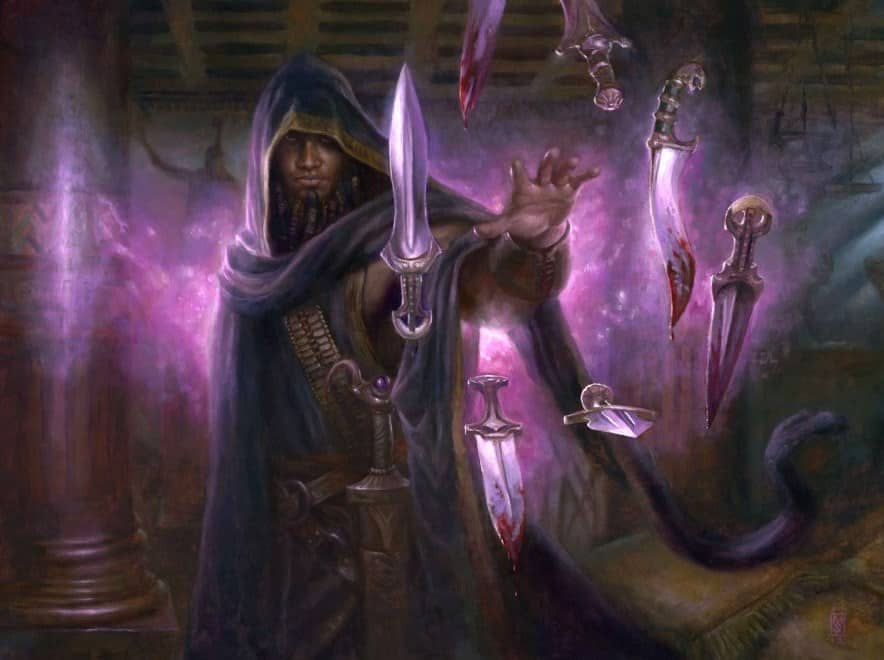Whether you are the vampire who is trying desperately to not act like a vampire or a thief who got caught trying to steal the jewels of the queen your party is hired to protect, fast-talking is the cornerstone of some D&D adventures. Of course, a healthy dose of magic to help those you are trying to persuade can be important, and no magic is more important than the charm person spell.
But, like with all magic, it can be tough to figure out who can use it, when to use it, and how to make sure it succeeds. Here’s our guide to the Charm Person spell in 5e.
The Stats For Charm Person
Here’s what you can find inside the Player’s Handbook for Charm Person:
- Enchantment: 1st Level
- Casting Time: 1 Action
- Range: 30 Feet
- Components: V, S
- Duration: 1 Hour
You attempt to charm a humanoid you can see within range. It must make a Wisdom saving throw and does so with advantage if you or your companions are fighting it. If it fails the saving throw, it is charmed by you until the spell ends or until you or your companions do anything harmful to it. The charmed creature regards you as a friendly acquaintance. When the spell ends, the creature knows it was charmed by you.
At Higher Levels. When you cast this spell using a spell slot of 2nd level or higher, you can target one additional creature for each slot level above 1st. The creatures must be within 30 feet of each other when you target them.
Who Can Use The Spell?

It is a first-level spell, meaning that any of the applicable classes can pick it from the first-level spell list. It is arguably a good spell for characters who want to focus on manipulating their environment and those around them. Bards are perfect candidates for this spell, as most bards are smooth talkers and know how to make people believe them. Amplify their natural abilities with the charm spell and watch the fun!
Warlocks and Wizards can also see some interesting uses of this spell, mostly when it comes to getting access to otherworldly information or into restricted areas. Finally, both druids and sorcerers have access to this spell.
Why Would You Use It?
Persuasion is part of the arsenal of every single adventurer because someone is eventually going to object to how the adventures do things. Whether it’s a king, a shop leader, a guard captain, or a bandit leader, these social roadblocks can help guide players and the campaign in different directions. This might force the players to come up with different solutions for problems or perform quests to get inside these NPC’s good graces.
But sometimes the fate of the world is at stake, or the players decide that they don’t have enough time to play politics. A charm Person can be an almost instant way to tear down the roadblock and turn someone who is indifferent to you into a friend.
How Does Charm Work?
Charm Person has someone see you as a friendly acquaintance, and they are more likely to do what you say. It isn’t minded control like some other mind-altering powers, so the person who is charmed can still refuse certain tasks, you just have a much higher chance of succeeding with them.
Think about it like asking a neighbor to do something vs your best friend. If you asked a neighbor you’ve met to help you move or drive you to a new town, they will probably refuse or at least require something in return to make it a fair trade. However, if you ask your best friend to do those tasks, they will jump at the chance and not ask for too much in return.
Charm turns someone into your character’s best friend, which makes them easier to persuade. They will still say no to certain things, especially things that cause them harm or would bring harm to others. Still, other requests might be more reasonable.
The effects last for one hour and the affected character can make a wisdom saving throw at the beginning of the spell to avoid the effects. If it succeeds then they ward off the spell, if they fail then they are charmed for one hour. Sounds like a cool spell right? Well, let’s focus on the last part, a part most players forget about whenever they make a charm on a high-ranking noble or guard captain.
Downsides Of The Charm Spell

When the spell ends, the creature knows it was charmed by you.
Basically, you can charm a king for one hour, but once the hour is up they will know what you did. This can be a problem. For example, if the king has a vault that only he can unlock with things inside an NPC needs, and your party charms the king into opening the vault so they can rob it, the charm will wear off. Then, the King will know that the party robbed him, and probably won’t be happy about it. This prevents the spell from being overused, but it can also open up some interesting roleplaying opportunities from the DMs perspective.
It can provide some serious consequences for the party whenever the target of the charm has the spell wear off. It can lead to future encounters, events, and also new opportunities depending on what the person did whenever they were charmed.
Additionally, races and characters with naturally high wisdom scores, creatures that are immune to charm, and monsters that use charm spells themselves will be very resistant to having their minds altered. Elves and fey folk are on this list, as are most vampires and other supernatural creatures.
Finally, as stated before it is not minded control, it simply makes the other person more agreeable to you. They can still choose to refuse if your request is outlandish or puts them in direct harm, forcing the party to find another route.
What About Monsters?
Now, Charm Person can specifically target humans and humanoid creatures. These include monstrous races including gnolls, goblins, lizardfolk, and more. However, monsters such as undead, harpies, merfolk, and animals cannot be charmed by this spell. They can be charmed by the spell Charm Monster, as well as some of the other domination spells in the game, but charm person only works on humanoids race.
The stat blocks for the creature in question will tell you if it is a monster or a monstrous humanoid.
When To Use Charm Person

This spell is best done as a roleplay or non-combat spell to aid in the persuasion of a single target. If you try to cast this spell in combat the target has the advantage for the saving throw, and while it might be friendly to you, your allies are a different story. Finally, the spell wears off and your enemy will probably still be your enemy once it’s over.
While you can use the spell in combat, there’s often too much that can go wrong to where it just isn’t useful to do so. It’s best used as a non-combat spell to aid in roleplaying and persuasion checks. These might include telling a guard to let your friend off the hook, convincing a shopkeeper to lower their prices, or deceiving a thief into leaving you alone.
At higher levels, where you can charm additional people for each level above first, you might be able to convince a group to do something that you want or get a squad of guards to work with you.
FAQs
Question: Can It Be Dispelled Before The Hour Is Up?
The identify spell can tell if someone is under the influence of being charmed, and the dispel magic spell can cancel a charming spell.
However, some natural charming abilities, such as the charm a vampire uses, cannot be affected by dispel magic. In that case, better hope you roll high for saving throws!
Question: What Happens If Charm Person Fails?
For example, let’s say you tried to charm an orc. The spell fails and the orc fought it off, and per the rules:
When the spell ends, the creature knows it was charmed by you. Then the orc would know that you tried to charm it because technically, the spell ended when he fought it off. It’s a little confusing and most DMs will handle the rulings on the spell differently whenever it comes up.
There will be a house rule for it, once it is established, you might be a bit wary when it comes to using the spell depending on what side of things your DM lands on.
How To Defend Against Charm Person?
Of course, for every single spell, you can learn, one of your enemies can learn it and use it against you. Demons, vampires, and other creatures can use charm person, subverting your defenses and making you see them as good friends. This can separate you from the party, cause some inter-party strife, and might even make you say or do things against the party’s interest for your new ‘friend.’
So you will need to know how to defend against it. Elves and Fey get an advantage when saving against being charmed, so playing as one of those characters is a no-brainer. You can also play as a character with a high wisdom score to try and nail the saving throw. Finally, you can count on your friends, because taking any sort of damage while charmed will break the effect, and your party might just want to smack the charm out of you!
Certain classes and skills, such as a Paladin’s Aura of Devotion and Bard’s countercharm spell can boost your saving throw. Additionally, some rare items do provide immunity to charm, and it will be up to your DM to see how they get into the world.
Perhaps the best defense is the fact that it is not minded control. It might take some out-of-character communication with your DM, but you can make a case for limits and things that your character would never do. That way, you can still roleplay your character effectively. It might take some trial and error, but if you get charmed you can still play your character and maybe even step into a different personality for a while!
- DnD Demons Guide: What Are Demons in 5e? - September 18, 2021
- Detect Thoughts 5e Guide: When, Why and How to Use It - September 9, 2021
- The Ultimate DnD Toll the Dead 5e Guide - September 9, 2021

